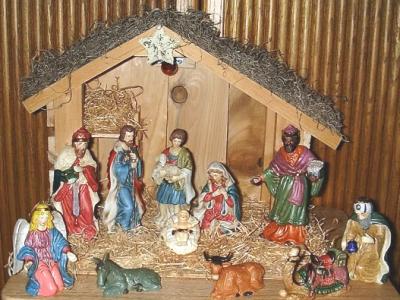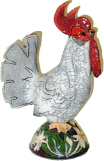THE WORD BECAME FLESH
 In Central America, setting up the Nativity is the center piece of the Christmas holiday. Households collect figures of Joseph, Mary, Jesus, shepherds, wise men, angels, and assorted animals. There is even a sort of competition when it comes to putting up a display.
In Central America, setting up the Nativity is the center piece of the Christmas holiday. Households collect figures of Joseph, Mary, Jesus, shepherds, wise men, angels, and assorted animals. There is even a sort of competition when it comes to putting up a display.
 Our brother Oscar Nolasco, minister for the Iglesia de Cristo on Johnson Street, told me about a time his family in Honduras was setting up their Nativity. He and his brothers were teenagers and his mother sent his brother to find animals to put in the display. His brother traveled to a shop 30 minutes from their home to find just the right figures. He gave his mother the first animal, a chicken. Then the second, another chicken. But the third was also a chicken. In fact all the animals for the nativity were chickens. Why did you get nothing but chickens? his mother asked. Thats all they had, Oscars brother replied. So that year, the nativity looked like it took place in a chicken coop rather than a stable.
Our brother Oscar Nolasco, minister for the Iglesia de Cristo on Johnson Street, told me about a time his family in Honduras was setting up their Nativity. He and his brothers were teenagers and his mother sent his brother to find animals to put in the display. His brother traveled to a shop 30 minutes from their home to find just the right figures. He gave his mother the first animal, a chicken. Then the second, another chicken. But the third was also a chicken. In fact all the animals for the nativity were chickens. Why did you get nothing but chickens? his mother asked. Thats all they had, Oscars brother replied. So that year, the nativity looked like it took place in a chicken coop rather than a stable.
The Nolasco nativity was not really any better or worse than any other nativity. Theres a lot about the traditional nativity presentation of the birth of Jesus that just doesnt jibe with the biblical stories in Matthew and Luke. We can get distracted over too many details such as how many chickens were there and miss the significance of birth. Matthew and Luke are the only gospels that mention how the birth of Jesus took place. Each gospel focuses on a different set of details. But they agree on the significance of the birth. In Johns gospel, the apostle balances the nativity scene. He wants us to know that no birth story or postcard image can contain the whole story of Christs beginnings. The story of Christs birth is more than a sentimental memory. It is not even aimed at establishing a celebration. The birth is a gospel proclamation in the sense that it proclaims something good and something new.
Without getting into the details of the event, John understands the significance of the birth of Jesus and this is how he begins his gospel ... (Read John 1:1-14)
John takes us where no gospel has gone before. We do not start with Mary or Joseph. We begin with creation. In the beginning was the Word. Remember the story in Genesis 1. God creates the world and all that is in it with spoken words. God says Let there be light. And it is so.
Unlike creation myths that tell us that what we see in creation is an accident, Genesis asserts that God made the world intentionally. God spoke and there was light. God spoke and there was life. This is the Word that was with God and was God. Because of Gods word there is a good creation. What was once empty and dark is now good it is full of light and life.
This alone is good, but now something new has happened with the birth of Jesus. The Word became flesh and made his dwelling among us. This is the concept of incarnation. And in a culture that is more familiar with reincarnation we would do well to understand again how the incarnation of God is good news.
Among the Christmas cards we received this week was one from Brad and Yvonne and their children. The saying on the front of the card says, The Word did not become a philosophy, a theory, or a concept to be discussed, debated, or pondered. But the Word became a person to be followed, enjoyed, and loved.
Very simply stated, this is the meaning of incarnation. The Word becomes flesh bone just like you and me so that we can get to know each other. Creation and creator are brought together in covenant. The glory of God is not far off. God is not unapproachable. He approached us.
This is news because God has become like us. There are any number of stories and examples of humans who claim to become gods. The emperors of Japan, the pharaohs of Egypt, and the Roman Caesars claimed to be divine. (In fact one of them, Vespasian, wasnt much of a believer in the claim. On his death bed joked that he was becoming a god). What is news is that God would become a human. That seems to cut against the grain. This is what inspired what may be one of the earliest hymns of the church found in Philippians 2 ... 5Your attitude should be the same that Christ Jesus had. 6Though he was God, he did not demand and cling to his rights as God. 7He made himself nothing; he took the humble position of a slave and appeared in human form. 8And in human form he obediently humbled himself even further by dying a criminal's death on a cross.
Why is this good news? God knows what it is like to live like us. He knows what it is like to be poor and hungry. He knows what it is like to be betrayed by friends and family. He knows what it is like to grieve the loss of a loved one. He knows what it is like to be afraid and to feel pain.
And think about the ministry of the Word made flesh. His first miracle was to bring joy to a wedding party. There was no crime as detestable as being a traitor or an adulterer in Judah, but when the Word made flesh dwelt among us and extended forgiveness he didnt simply say I forgive you. He ate a meal with them. He didnt stand behind a line or put on a surgical mask and gloves to heal lepers. He embraced them. When the crowd starving for truth got hungry he didnt leave them on their own but he provided food.
This week we received a call from a brother who has moved back to this area. He is in the hospital with a staph infection worsened by diabetes. He has been in the hospital for quite some time. He simply called asking to study the Word. We talked on the phone for a while and it became clear that what he wanted was not only a study, but a visit. He could pick up a book and study. He could watch a preacher on TV and "study." But visits from people who come to the hospital bringing their presence and prayers are something more than study.
And I dont have to explain that to you, do I? Maybe because we are flesh and blood creatures we understand that there is something important about being present. So does God. Thats why, as Petersen says in the Message translation, The Word became flesh and blood and moved into the neighborhood.
Chris Benjamin
West-Ark Church of Christ, Fort Smith, AR
Morning Sermon, 25 December 2005
 Link to next sermon
Link to next sermon
 Link to other sermons of Chris Benjamin
Link to other sermons of Chris Benjamin
 In Central America, setting up the Nativity is the center piece of the Christmas holiday. Households collect figures of Joseph, Mary, Jesus, shepherds, wise men, angels, and assorted animals. There is even a sort of competition when it comes to putting up a display.
In Central America, setting up the Nativity is the center piece of the Christmas holiday. Households collect figures of Joseph, Mary, Jesus, shepherds, wise men, angels, and assorted animals. There is even a sort of competition when it comes to putting up a display.
 Our brother Oscar Nolasco, minister for the Iglesia de Cristo on Johnson Street, told me about a time his family in Honduras was setting up their Nativity. He and his brothers were teenagers and his mother sent his brother to find animals to put in the display. His brother traveled to a shop 30 minutes from their home to find just the right figures. He gave his mother the first animal, a chicken. Then the second, another chicken. But the third was also a chicken. In fact all the animals for the nativity were chickens. Why did you get nothing but chickens? his mother asked. Thats all they had, Oscars brother replied. So that year, the nativity looked like it took place in a chicken coop rather than a stable.
Our brother Oscar Nolasco, minister for the Iglesia de Cristo on Johnson Street, told me about a time his family in Honduras was setting up their Nativity. He and his brothers were teenagers and his mother sent his brother to find animals to put in the display. His brother traveled to a shop 30 minutes from their home to find just the right figures. He gave his mother the first animal, a chicken. Then the second, another chicken. But the third was also a chicken. In fact all the animals for the nativity were chickens. Why did you get nothing but chickens? his mother asked. Thats all they had, Oscars brother replied. So that year, the nativity looked like it took place in a chicken coop rather than a stable.
